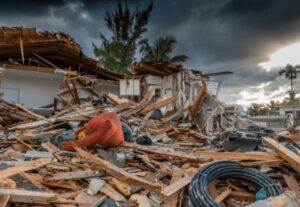 Last week, NICB has identified nearly half a million claims (471,581) related to Hurricane Ian with a majority of the claims (431,702) reported in Florida. Nearly two-thirds of the Florida claims are homeowner and business claims (272,465), and the remaining are personal automobile claims (151,892).
Last week, NICB has identified nearly half a million claims (471,581) related to Hurricane Ian with a majority of the claims (431,702) reported in Florida. Nearly two-thirds of the Florida claims are homeowner and business claims (272,465), and the remaining are personal automobile claims (151,892).
As insurance claims continue to increase following Hurricane Ian, the National Insurance Crime Bureau (NICB), the insurance industry’s association dedicated to predicting, preventing, and prosecuting insurance crime, is warning victims to beware of post-disaster scams as they begin the rebuilding process.
Despite substantial damage to homes, businesses, and vehicles following Hurricane Ian, NICB encourages residents to take their time and not try to accelerate the rebuilding process in order to avoid being scammed.
“We know residents want to get back on their feet, but we are already seeing dishonest fraudsters who are preying on unsuspecting victims like vultures,” said NICB President and CEO David Glawe. “This is not the time to let your guard down. Stay vigilant and protect yourself and your loved ones from these criminals.”
Before hiring a contractor, call your insurance company. There is no need to rush into an agreement with a contractor who solicits your repair work, especially if it was not requested.
NICB SUGGESTS YOU CONSIDER THESE TIPS BEFORE HIRING A CONTRACTOR:
- Get more than one estimate.
- Get everything in writing. Cost, work to be done, time schedules, guarantees, payment schedules, and other expectations should be detailed and itemized.
- Request references and do the research.
- Ask to see the salesperson’s driver’s license and write down the license number and their vehicle’s license plate number.
- Look out for out-of-state contractor licenses, as well as vehicle registrations, as these may also indicate possible fraudulent contractors.
- Never sign a contract with blanks; terms you don’t agree with can be added later.
- Never pay a contractor in full or sign a completion certificate until the work is finished.
- Ensure reconstruction is up to current code.
- Make sure you review and understand all documents sent to your insurance carrier. Signing an Assignment of Benefits agreement transfers your insurance rights to the contractor. Know what that means for you.
- Never let a contractor pressure you into making a quick decision or hiring them.
- Never let a contractor interpret the language of your insurance policy.
- Never let a contractor discourage you from contacting your insurance company. Contact your insurance company first.
- Remember, if you didn’t request it, reject it!
Furthermore, some deceitful contractors will state they are supported by the government. However, the Federal Emergency Management Agency does not endorse individual contractors or loan agencies. Always request official identification from those claiming to represent governmental agencies. Consumers should call FEMA for more specifics at (800) 621-FEMA.
If you believe you have been a victim of fraud, call the NICB at 1-800-TEL-NICB or report it here.
REPORT FRAUD: Anyone with information concerning insurance fraud or vehicle theft can report it anonymously by calling toll-free 800.TEL.NICB (800.835.6422) or submitting a form online.



Things were pretty bad over there. Public Adjusters are really busy over there, and will be for a while.